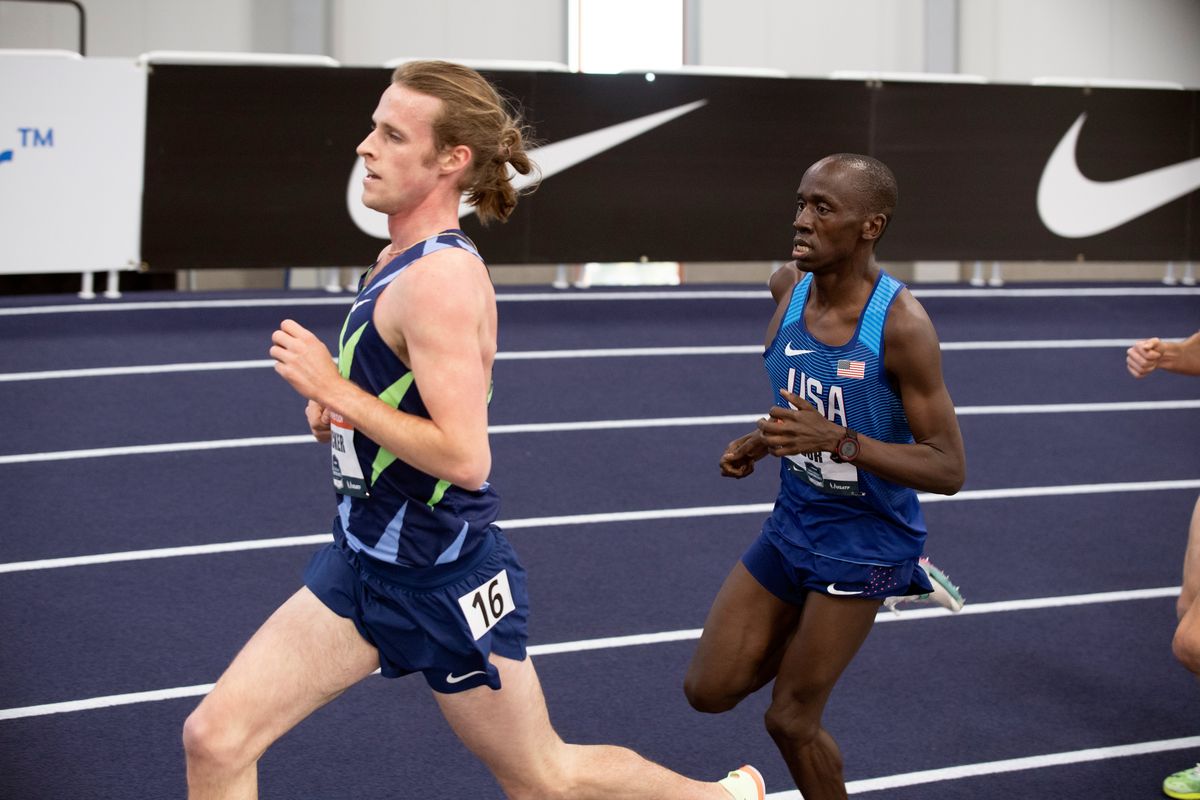Olympian Cole Hocker returns to the Podium after rocky 2022 season

Even overnight sensations – misnomers though they are – have to live through the occasional nightmare.
For Cole Hocker – once described by his main training partner as “the future of American running” – it’s meant that he’s absorbed some wild swings of emotion in his still young track career.
High summits. Sudden falls.
“There can be great rewards and some hard moments to get your head around,” the 21-year-old Olympian said, “but it gives you some balance.”
And it’s the kind of thing that has him eager to see what’s around the corner in 2023, which begins for him Friday night on the track inside the Podium in Spokane at the second Lilac Grand Prix.
The top American miler of 2021, Hocker will run the 3,000 meters in the brisk, eight-race program hosted by Portland’s Nike Union Athletic Club, and he’s anticipating a good vibe. After all, he won that event and the 1,500 in the Podium last February at the USATF indoor championships – setting arena records in both. It made for an enthusiastic reception.
“I was shocked,” Hocker said. “I came around that final lap of the 3,000 and it was loud in there. Anyone who gets a chance to race there won’t regret it.”
Alas, it proved to be the high point of Hocker’s year.
His appearance in the Olympic 1,500 final in Tokyo the summer before suggested bigger things in a world championships year, particularly with the meet in his adopted hometown of Eugene. And Hocker appeared on track to make the U.S. team again after running a 3-minute, 50.97-second mile at the Prefontaine Classic. But he began experiencing foot trouble just a day later and a stress reaction was diagnosed, which limited him to cross training in the weeks before the USATF outdoor championships. The lack of sharpness resulted in Hocker fading down the stretch of his heat and finishing a nonadvancing sixth.
“It wasn’t a major injury, but the timing was major and it’s probably the hardest thing I’ve gone through in this sport,” he said. “For the (world championships) to be in Eugene and not to be part of it was crushing. I see myself running at the Diamond League level and on the world stage and anything less is a disappointment.”
Not content to write off the entire season, Hocker did make it back for some second-tier races in Europe – running 3:35.18 for 1,500 meters in Italy and 3:50.7 clocking in the Fifth Avenue Mile in New York.
“There wasn’t anything to be gained from a truncated season,” Hocker said. “Even if it wasn’t on a grand stage or get much attention on social, I think it showed what I was capable of.”
But Hocker’s been doing that since he moved west after high school in Indianapolis in 2019.
It wasn’t as if he was under the radar. He was a Foot Locker national cross country champ and picked Oregon over noted distance mills Northern Arizona and Colorado. But COVID-19 wiped out the 2020 track season and any opportunity for an instant splash with the Ducks – even as it also allowed uninterrupted training with some challenging company like NCAA champion Cooper Teare.
“Getting here, I was on the bottom of the totem pole,” Hocker said. “There were already four or five sub-4 guys on the team and I was looking up to them. I wasn’t able to jump into every workout and keep up. But through the fall and winter, we kept pushing each other and by the time racing came around (in 2021), I was a completely new athlete. I’d made some big steps out of the public light.”
Three NCAA titles followed – two indoors, one out. He lowered his high school mile best of 4:05 (in a relay) down to 3:50.55. And at the U.S. Olympic Trials, he ran down 2016 gold medalist Matthew Centrowitz in the final strides.
It made him – at age 20 – the youngest American track Olympian since Marty Liquori in 1968.
And it wasn’t just a happy-to-be-there circumstance. Hocker ran a lifetime best in the semis to race himself into the final, and in a final that saw seven runners dip under the existing Olympic record, Hocker ran sixth in a lifetime-best 3:31.40.
“I’m not going to lie – it all seemed to come fast,” Hocker said of his emergence. “Just knowing I’m going to be comfortable sitting in there with a world champ would have been unfathomable two or three years ago.
“Making the Olympics was surreal – I can’t really put into words how that feels. You go through this syndrome thinking, ‘Am I this good? Is this a fluke?’ You have to remind yourself that you earned this and don’t get there on accident.”